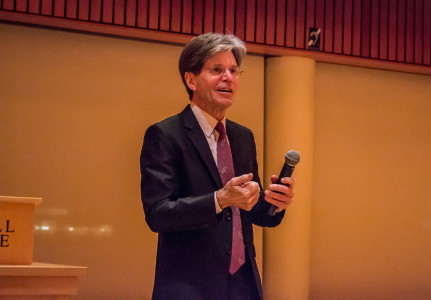Emily Ricker
rickerem@grinnell.edu
On Feb. 16 to Feb. 18, the Grinnell College Center for the Humanities hosted a French Film Festival. The Festival featured three films from the 1930s poetic realist movement in France, and culminated in a talk by renowned film theorist and Yale professor Dudley Andrew.
This is not the first event of its kind that the Humanities Center has organized.
“The [Center] in the last few years has built a tradition of organizing film festivals in February,” said Shuchi Kapila, English, Director of the Center for the Humanities. This year the Center decided to design the festival around the theme “Sites of Creativity” and chose films and a speaker that would fit within that theme.
“Film festivals are one of the great alternate public spheres that we have in a world that’s dominated by television and demagoguery or atomized small groups the all follow their closely-affiliated blog lines,” Andrew said when asked about the importance of these events on college campuses. “Citizens of all different kinds get together and give their time to something … they can think about and talk about afterwards.”
Films emanating from the poetic realist movement on which this Festival focused tend to depict proletariat subgroups of society, emphasize tensions between upper and lower classes, and feature highly aesthetic representations of nostalgia and disillusionment.

The films shown this week all showcased these ideas.
The film “A Day in the Country” told the story of a brief love affair through impressionist cinematography. “Zéro de Conduite” explores a group of boarding school students revolting against oppressive rules, while “The Lower Depths” depicts the story of a baron-turned-pauper forced to move to the slums of Paris.
“The three films were chosen at the recommendation of the speaker … he said these would be good and then he built his talk around them,” Kapila said.
For the Festival’s concluding event Thursday evening, Professor Andrew delivered a lecture entitled, “From ‘Ciné-Liberté’ (1936) to ‘Film Maudit’ (1949): Fever, Contagion, and Caution in the Avant-Garde.”
Andrew discussed at length the intersection of politics and cinema in 1930s France. Specifically, he explained the relationship between the rise of the Popular Front—an alliance of left-wing parties that formed in the French government at the time—and the films created during this era. Additionally, he described the role many of the films played in the growing popularity of the Communist Party.
Later in the talk, Andrew turned his focus to the dynamics and inner workings of the creative teams responsible for this period’s most successful films.
“His creativity depended on the inventiveness of those around him,” Andrew said of Renoir, who is widely accepted as the greatest filmmaker of the time. He went on to explain the interactions between several of the most prominent film-creation teams in 1930s France, and stressed his belief that the work of all groups improved as they began to collaborate with each other.
Andrew concluded his lecture by explaining the potential of college campuses to become catalysts for creative movements.
“Perhaps dingy dorm rooms [are] the spaces in which creative movements can best be born,” Andrew said.
Andrew’s talk is part of an ongoing lecture series on creative spaces hosted by the Center of the Humanities that will continue until the end of the semester. The next talk, entitled, “Conversation in the Humanities,” is planned for Wednesday, Feb. 24.

















































